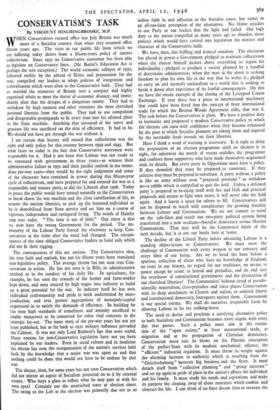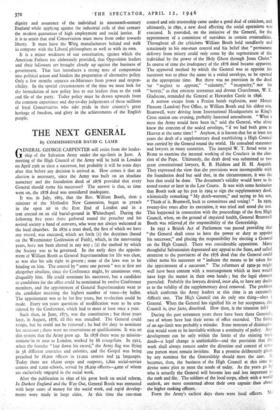CONSERVATISM'S TASK
By VISCOUNT HINCHINGBROOKE, M.P.
WHEN Conservatives vacated office last July Britain was much more of a Socialist country than when they assumed office fifteen years ago. The vices in cur public life from which we are suffering today derive from a fifteen-years policy of intense collectivism. Since 1931 no Conservative statesman has been able to legislate on Conservative lines. (Mr. Butler's Education Act is perhaps the sole exception.) The world economic collapse of 1931, followed swiftly by the advent of Hitler and preparation for the war, compelled our leaders to adopt policies of integration and centralisation which were alien to the Conservative faith. They had to marshal the resources of Britain into a compact and highly organised whole to meet the threat of economic disaster, and imme- diately after that the designs of a dangerous enemy. They had to withdraw by high taxation and other restraints the most cherished personal liberties from the public. They had to use compulsion and disagreeable.propaganda to fit every man into his allotted place in the State machine. Anything that savoured of the suave and gracious life was sacrificed on the altar of efficiency. It had to be. We should not have got through the war without it.
I am certain that history will record that collectivism was the right and only policy for this country between 1929 and 1945. But what faces us today is the fact that Conservative statesmen were responsible for it. Had it not been that Labour was not ready to be entrusted with government in those years—as witness their administrative failure in 1931 and their pacifist outlook in the imme- diate pre-war years—they would by the right judgement and sense of the electorate have remained in power during this fifteen-year cycle of collectivism, and have prepared for and entered the war as a responsible and mature party, as did the Liberals after 1906. Today in peace the public would have turned naturally to the Conservatives to break down the war machine and the close cartelisation of life, to restore the ancient liberties, to pick up the harassed individual as he is demobilised from State service and set him on a course of vigorous, independent and variegated living. The words of Hamlet ring true today. " The time is out of joint." Our curse is that we now have the wrong Government for the period. The im- maturity of the Labour Party forced the electorate to keep Con- servatives at the helm after the wind had changed. The circum- stances of the time obliged Conservative leaders to hoist sails which did not fit their rigging.
The consequences of this are serious. The Conservative idea, the true faith and outlook, has not for fifteen years been translated into legislative policy. The average elector has not seen true Con- servatism in action. He has not seen it in Bills, in administrative method or in the conduct of his daily life. In agriculture, for example, he has seen the rewards of the farmer and farm-worker kept down, and men enticed by high wages into industry to build up a great potential for the war. In industry itself he has seen individual craftsmanship and pride in work undermined by mass- production, and ever greater aggregations of monopoly-capital acquiesced in to satisfy the demands of efficiency. In building he has seen high standards of comeliness and amenity sacrificed to enable manpower to be conserved for other vital concerns in the strategic lay-out. The inner story of the pre-war years has not yet been published, but as far back as 1931 military influence pervaded the Cabinet. It was not only Lord Baldwin's lips that were sealed. Many reasons for non-Conservative legislation have not yet been explained by our leaders. Even in social reform and in medicine the elector has seen the reorganisation of the nation's services held back by the knowledge that a major war was upon us and that nothing could be done that would not have to be undone by that war.
The elector, then, for some years has not seen Conservatism which did not mirror an aspect of Socialism projected on to it by external
events. Who buys a glass to reflect what he may gaze at with his own eyes? Certainly not the unattached voter at election times. The swing to the Left at the election was primarily due not to an
ardent faith in and adhesion to the Socialist cause, but rather to an all-too-faint perception of the alternative. No blame attaches to our Party or our leaders that the light had failed. Our high duty to the nation compelled us many years ago to abandon those policies which would have carried into legislation the instinct and character of the Conservative faith.
We have, then, this baffling and ironical situation. The electorate has placed in power a Government pledged to maintain collectivism when the elector himself desires above everything to regain his individuality ; pledged to produce a society planned by a handful of doctrinaire administrators when the man in the street is seeking freedom to plan his own life in the way that he wants it ; pledged to carry on and intensify nationalism in a world that is seeking to break it down after experience of its fearful consequences. On this we have the recent example of the closing of the Liverpool Cotton Exchange. If ever there was a piece of international machinery that could have been fitted into the concept of freer international trade for which the Bretton Woods Agreement calls, that was it. The task before the Conservatives is plain. We have a positive duty to formulate and propound a modern Conservative policy to which the electors can turn with confidence when they become exhausted by the pace at which Socialist planners are taking them and angered by the inevitable fresh inroads on their liberties.
Here I think a word of warning is necessary. It is right to delay the preparation of an election programme until an election is in sight, for otherwise the march of events stultifies the programme and confuses those supporters who have made themselves acquainted with its details. But every party in Opposition must have a policy. If they demolish they must be prepared to construct. If they criticise they must be prepared to substitute. A party without a policy is like an army without even " prepared positions " to withdraw to—a rabble which is compelled to quit the field. Unless a defeated party is prepared to re-equip itself with fire and faith and practical proposals and return to fight once more, it will never take the field again. And it leaves a space for others to fill. Conservatives will not be disposed to watch with complacency the growing hostility between Labour and Communism. We are not content to stand on the side-lines and watch our two-party political system being transferred into a new medium—Socialist democracy versus Marxist Communism. That may well be the Continental battle of the next decade, but it is not our battle here at home.
The decline of the Liberal Party before advancing Labour is a standing object-lesson to Conservatives. We must meet the challenge of Communism with every weapon in our armoury and every fibre of our being. Are we to bend the knee before a spurious collection of aliens who have no knowledge of England, no roots in our history, no regard for our traditions, no means to power except by resort to hatred and prejudice, and no end save the overthrow of constitutional government and the destruction of our cherished liberties? The Communists' hideous creed of pseudo- scientific materialism, class-prejudice and force places Conservatism with its deep attachment to Church and nation, to ordered liberty and constitutional democracy, foursquare against them. Communism is our special enemy. We shall do ourselves irreparable harm by allowing Labour to be the stalking-horse.
The need to devise and proclaim a satisfying alternative policy to both Socialism and Communism becomes more urgent with every day that passes. Such a policy must aim at the recrea- tion of the "open society," at freer international trade, at migration and at the propagation of Christian democracy. Conservatism must rain its blows on the Platonic conception of the perfect State with its modern mechanical adjunct, the "efficient" industrial organism. It must throw its weight against the alarming increase in authority which is resulting from the "Gleichschaltung " between big business and the State. It must detach itself from " collective planning " and " group interests " and set up again in pride of place in the nation's affairs the individual and his family. It must study his needs and aspirations and make its purpose the clearing away of those restraints which confine and obstruct his life. I can think of no finer dream than to recreate the
dignity and assurance of the individual in nineteenth-century England while applying against the industrial evils of that century the modern guarantees of high employment and social justice. If it is to attain that end Conservatism must move from order towards liberty. It must leave the Whig manufacturers behind and walk in company with the Liberal philosophers as well as with its own.
It is a minor weakness of our constitution, against which the American Fathers too elaborately provided, that Opposition leaders and their followers are brought closely up -against the business of government. That fact introduces a strong note of compromise into political action and hinders the preparation of alternative policy. Only a few months separate ex-Ministers from power and respon- sibility. In the special circumstances of the time we must look for the formulation of new policy less to our leaders than to the rank and file of the party. Today policy must be drawn upwards from the common experience and day-to-day judgements of those millions of loyal Conservatives who take pride in their country's great heritage of freedom, and glory in the achievements of the English people.



























 Previous page
Previous page